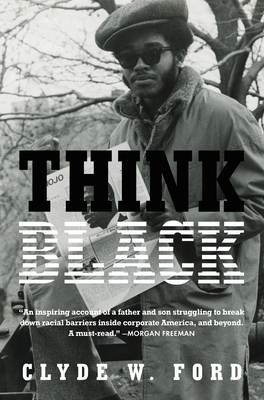
Think Black
A Memoir
کتاب های مرتبط
- اطلاعات
- نقد و بررسی
- دیدگاه کاربران
نقد و بررسی

Starred review from July 15, 2019
A memoir/social history of a trailblazing father, his headstrong son, and their struggles with racism in the tech industry. In 1971, Ford (Whiskey Gulf, 2009, etc.) followed his pioneering father's footsteps through the doors of IBM. Nearly three decades earlier, the elder Ford had become the company's first black systems engineer, handpicked by the president and founder of the company, Thomas J. Watson Sr. But where his father was a conformist, seemingly unwilling to challenge the racism at the ultraconservative company, the rebellious author, then 19, showed up for work with "a ballooned Afro, pork chop sideburns [and] a blue zoot suit with red pinstripes." Ford chronicles both his and his father's careers, from the dawn of the digital age that his father's expertise helped usher in. Frequently at odds, the two men disagreed about Clyde's future, the war in Vietnam, and the civil rights movement. A masterful storyteller, Ford interweaves his personal story with the backdrop of the social movements unfolding at that time, providing a revealing insider's view of the tech industry. IBM's storied past is not without blemish. Ford details the company's involvement with the Nazis during the Holocaust and with the South African government under apartheid. Whether recounting the domestic drama that played out between his parents or how his father taught him to program IBM's first computer as a kid, Ford provides a simultaneously informative and entertaining narrative. He delves into historical and contemporary intersections of race, history, and technology to show that technical advancements are never completely bias-free because they are driven by humans, who are inherently biased. Ultimately, Ford learned that his father did challenge the system at IBM in covert but lasting ways. He also gives a call to action to readers to challenge the current lack of diversity in tech as well as the racism that technology is used to perpetuate in society at large. A powerful, engrossing look at race and technology.
COPYRIGHT(2019) Kirkus Reviews, ALL RIGHTS RESERVED.

August 1, 2019
This memoir intersperses stories from Ford's (The Hero with an African Face) experiences growing up as a young black man in the 1960s and memories of his father, John Stanley Ford, the first black software engineer at IBM, with reflections and analysis on the intersections of race, prejudice, and technology. Hired in 1946, John Stanley faced biases at work and struggled with misguided beliefs about the relationship between skin color and intelligence. He began teaching his son computer programming and advanced mathematics when Ford was young. Ford, who later worked briefly at IBM, points out that science, math, and technology aren't value free; that their applications are often predicated on exploitation and prejudice. He describes companies using positive diversity history for PR benefit while ignoring incidences of discrimination. He further examines the ways supposedly neutral technologies have been put to nefarious purposes by those seeking racial purity and reviews how internet search results can be manipulated and misunderstood, noting the prejudice ramifications of algorithms used for job screening and policing. VERDICT Recommended for readers interested in histories of computing and business, and black history, especially regarding STEM.--Monica Howell, Northwestern Health Sciences Univ. Lib., Bloomington, MN
Copyright 2019 Library Journal, LLC Used with permission.

Starred review from August 12, 2019
In this powerful memoir, Ford (Whiskey Gulf) tells the story of his father’s tenure as IBM’s first black systems engineer. Though he was recruited in 1947 by the company’s founder, Thomas J. Watson Sr., John Stanley Ford endured 25 years of racism from his white coworkers, who repeatedly tried to get him fired. “Like Robinson, my father had also stepped into a role elevating him as a symbol much larger than his individual self,” Ford writes. Writing with a potent sense of outrage, Ford portrays his father as more conciliatory than he would have been when he himself was hired by IBM in 1971 and brought with him an African nationalist pride. Throughout, Ford details IBM’s racist history supporting both the Nazis and apartheid, and how his father, in his stoicism, fought back against the company’s racism (he obtained a document that contained answers to questions on IBM’s entry exam and gave it to black applicants). Ford came to see his father as a fighter who made his life as a black man better. “Whenever I hear the blips and beeps, the whines and whirs of a computer,” Ford writes, “I recall what I learned from my father about these machines, about being a man who’s Black, and about being first.” Ford’s thought-provoking narrative tells the story of African-American pride and perseverance.

























دیدگاه کاربران